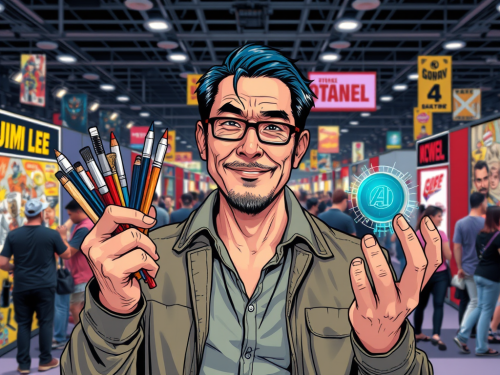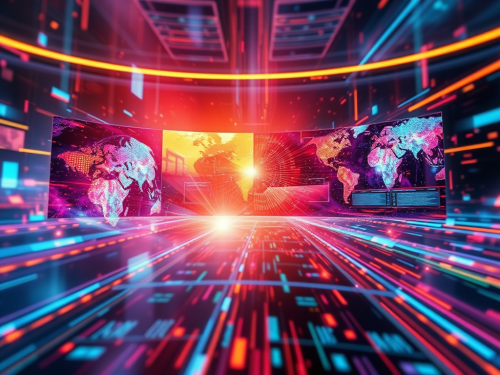There are certain celebrities and pop culture icons that we tend to appreciate more after they’ve passed away. Like everyone else, they too must face death at some point in their illustrious lives. And when they do, all the work they did becomes inherently more precious because it is now finite. There can be nothing new added to their body of work. It’s as set as the strongest bedrock. It might be upsetting to many fans, but it’s just a fact of life.
Then, artificial intelligence comes along and suddenly, there’s a crack in that bedrock.
Even as someone who has closely followed and written about artificial intelligence for years, I did not see this coming. And it took a form I never would’ve expected.
Recently, a couple of comedians utilizing an unspecified AI created an hour-long comedy special featuring the late, great George Carlin. That “special,” and I use that term loosely, is currently on YouTube right now. For reasons that I hope are understandable, I’m not going to link to it. Just know that, as of me writing this, it has racked up over 427,000 views and 11,000 likes.
Now, in general, I support the development of artificial intelligence. I still genuinely believe it is the most important technological advancement we could develop as a species. But this particular manifestation of its use has me both concerned and distressed.
For one, George Carlin is my favorite comedian. I would go so far as to call him the single greatest comedian of all time. And that’s an opinion many share. Ask most people who the best comedian of all time is and George Carlin is usually in the top five alongside the likes of Richard Pryor, Lenny Bruce, Rodney Dangerfield, Sam Kinison, and Robin Williams.
To me, George Carlin is the best and there’s no close second. He’s one of those comedians who didn’t just find success over the course of multiple decades. You can still go back and watch his specials from the 1970s and his material is still relevant. His jokes, his style, and his brilliant insights are still on point, as well as hilarious.
George Carlin really was a one-of-a-kind artist, comedian, and philosopher. And when he passed away in 2008, his death hit a lot harder than most. But his legacy has only strengthened in that time as more people discover or re-discover his comedy. But this AI version of him is sure to complicate that legacy and for all the wrong reasons.
For one, this “special” was done without permission, review, or compensation to George Carlin’s family. His daughter, Kelly Carlin, has gone on record as stating that she did not authorize this, let alone receive compensation for it. This was not an instance of a celebrity willingly licensing their voice or likeness to a company, as James Earl Jones did with Disney in 2022. This was done without any consideration whatsoever for how Carlin’s family might react to this or what it might do to his legacy.
As for the special itself, I do admit I have listened to it. And I can confirm that it sounds nothing like George Carlin. The voice sounds like a terrible impersonation of George that someone half-drunk would try to do on a five-dollar bar bet. I promise nobody is ever going to mistake the voice in this “special” for George Carlin. I don’t know if that’s by design or just a limit of the current technology.
But with regards to the actual substance, this is where it gets even more distressing. Because in many instances, there are jokes and comments that actually sounds like something Carlin would say. Yes, they lack his distinct delivery, tone, and mannerisms. But many of his comments on politics, pop culture, people, and society really do feel like they might come up in a real special.
That said, there are also instances where it says things Carlin probably wouldn’t say. There’s nothing too egregious. He never says anything that sounds so out-of-character that it’s jarring. But it’s also clear that the content was edited. There are distinct breaks in the audio that indicate someone edited this to sound more refined. That leads me to believe that, whatever AI was used to make this definitely conjured some content that would’ve been too obviously out-of-character.
I’ll even go so far as to say that there are some parts of the special that are funny. It still doesn’t resonate as well as one of Carlin’s classic comedy specials. But there are jokes in this special that probably will make some people laugh. It’s not entirely clear if those jokes were purely the product of the AI or if those behind it tweaked the language. But the humor is there.
Be that as it may, just listening to a small part of this special feels off. Beyond just sounding painfully synthetic, it establishes a precedent that the estates of other dead celebrities would be wise to consider. Because George Carlin isn’t the only one with a long catalog of comedy, writings, interviews, and movie credits.
Who’s to say that an AI like this won’t do the same for Robin Williams or Richard Pryor? It wouldn’t even be restricted to comedians, either. The works of musicians like John Lennon, Kurt Cobain, Michael Jackson, and Elvis Prestly could also be used to create entirely new songs that might sound eerily similar to something they might have created.
If that happens, what does it do to their legacy? What happens if an AI creates something in the mold of a dead celebrity that says or does something outrageous, offensive, or detrimental? What would it do to their legacy? What would it do to their still-living families?
I honestly can’t imagine how someone like Kelly Carlin must feel hearing a poor imitation of her dead father. But I can easily imagine other celebrity heirs or estates willingly licensing their dead relatives to make extra money somehow.
It could mean we’ll be seeing more strange, distressing content like this in the coming years. And as AI technology continues to improve, it will likely get to a point where it’s so capable that it’s almost too believable. I don’t claim to know what kind of world that might create or lead to. I just know that “specials” like this won’t stop with George Carlin.








